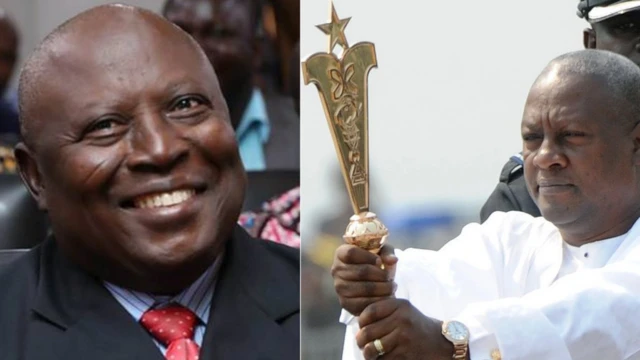Dec. 7 elections: Martin Amidu endorses Mahama
In a bold and candid statement, former Special Prosecutor and Attorney General of Ghana, Martin Amidu, has weighed in on the upcoming 2024 presidential election, urging voters to prioritize pragmatism over partisanship. With sharp criticism of both the current administration and former President John Dramani Mahama, Amidu, known for his principled stance on probity and accountability, nevertheless makes a compelling case for Mahama’s candidacy in the face of Ghana’s political and constitutional crises.
Amidu, who has had public disagreements with Mahama in the past, acknowledges the former president’s flaws but argues that these should not overshadow the critical need for experience and a firm hand in the post-2024 transition period. In a statement released on December 3, 2024, Amidu stated, “John Dramani Mahama is not a saint, but he is nobody’s poodle.” He contends that Mahama’s presidency, marked by his leadership during Ghana’s economic difficulties and subsequent years of political opposition, provides him with a unique skill set to navigate the turbulent waters of post-Akufo-Addo governance.
The heart of Amidu’s argument lies in the necessity of an experienced leader who can audit the mess left behind by the Nana Akufo-Addo and Mahamudu Bawumia administration. The eight-year tenure of the Akufo-Addo government, according to Amidu, has seen constitutional and fiscal practices that warrant scrutiny. “We need a candidate who can command a sizeable parliamentary representation to actualize an audit of the previous government,” Amidu writes. This audit, he argues, is crucial not only to ensure accountability but also to safeguard the integrity of Ghana’s democracy.
The former Special Prosecutor insists that Ghana’s 1992 Constitution, which enshrines democratic principles and rejects cronyism, is under threat by a government that has failed to live up to its promises. While Amidu has consistently advocated for constitutional integrity, he warns that the electorate must reject attempts to undermine this framework by electing leaders who prioritize national interest over personal or partisan gain. “The 1992 Constitution does not enshrine dynasty or inheritance by cronyism,” Amidu states, urging the electorate to make a change on December 7, 2024.
In his eyes, Mahama stands as the most viable candidate to safeguard the Constitution. His previous tenure as president and his years of experience as a statesman put him in a position to be a stabilizing force, capable of ushering in the necessary reforms. “John Dramani Mahama whose audit Nana Akufo-Addo fears ought to be the best bet for the integrity of the 1992 Constitution in our present circumstances,” Amidu writes, further asserting that the former president’s return would represent a step towards restoring accountability in government.
Despite his past criticisms of Mahama, Amidu seems willing to set aside personal grievances for the sake of the greater good. “I have had problems with John Dramani Mahama in the past which are documented on my website,” Amidu admits, acknowledging that his position on Mahama is shaped by historical context but tempered by the reality of Ghana’s current political landscape. In a message that blends realism with idealism, he calls for voters to put national interest above partisanship and personal loyalty, advocating for pragmatism in an election that could determine the future of Ghana’s democracy.
Amidu’s statement is not just an endorsement of a candidate, but a rallying cry for voters to recognize the stakes of this election. The former Special Prosecutor emphasizes the urgency of defending the integrity of the 1992 Constitution, warning that Ghana’s democracy is at a crossroads. The upcoming election, Amidu argues, is an opportunity to ensure that Ghana remains a constitutional republic, free from the corrupting influences of nepotism and dynastic politics.
“Ghana must always come first!” he concludes, signaling that the path forward requires unity, integrity, and a commitment to constitutionalism.
As the December 7 elections approach, Martin Amidu’s words serve as both a challenge and a call to action for the Ghanaian electorate. In a moment of national reflection, the question remains: will Ghanaians heed this call for pragmatism and safeguard the future of their republic?
Watch the video:
























































